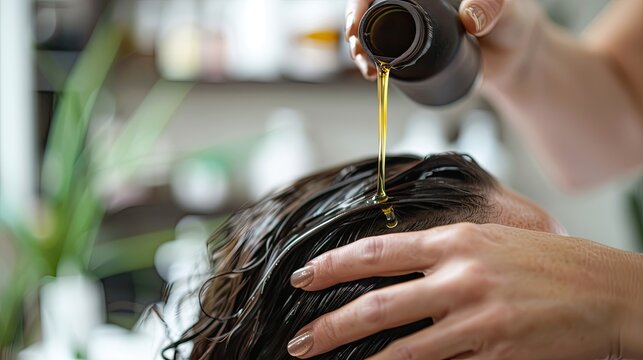Is Rosehip Oil Good for Hair? Benefits and Uses Explained!
For professionals working in the beauty industry, including beauticians, understanding the benefits of natural ingredients is key to offering effective solutions to your clients. One ingredient stirring curiosity is rosehip oil. But is rosehip oil good for hair? Let's dive deep into how it works, its benefits, and why beauticians should consider recommending it to clients for improved hair health.
Rosehip oil, derived from the seeds of the wild rose plant often referred to as Rosa canina, has long been celebrated for its skincare benefits. But its ability to revolutionize hair care has been gaining traction. Known for being nutrient-dense and packed with fatty acids, vitamins, and antioxidants, rosehip oil offers a treasure trove of benefits for treating hair damage, boosting shine, and promoting scalp health.
:max_bytes(150000):strip_icc()/use-oil-nourish-your-hair-naturally-4858483-12-6013f6eb0dd64ecca293638bcb034d85.jpg)
What Makes Rosehip Oil Beneficial for Hair?
To answer the question, Is rosehip oil good for hair?, it's essential to examine its composition. Rosehip oil is rich in:
- Essential Fatty Acids: These strengthen the hair cuticle and prevent breakage.
- Vitamin C: Boosts collagen production, encouraging hair growth.
- Vitamin A: Regulates sebum production to combat oily scalp or dryness.
- Antioxidants: Protect hair from environmental damage and oxidative stress.
The combination of these nutrients makes rosehip oil highly versatile, benefiting all hair typesstraight, curly, textured, or treated. Beauticians can confidently recommend the oil to clients looking for both preventative care and damage repair solutions.
How Can Rosehip Oil Address Common Hair Issues?
Beauticians often face clients troubled by frizz, dryness, or scalp issues. Consider how rosehip oil could address these challenges:
1. Hydrates Dry and Brittle Hair
The fatty acids and vitamins, particularly Vitamin E, make rosehip oil a game-changer for dry hair. It locks in moisture and enhances elasticity, reducing the likelihood of split ends.
To learn about other oils offering hydration, check pumpkin seed oil.
2. Fights Scalp Issues
Whether its dandruff or irritation, rosehip oil soothes inflammation while regulating sebum production. Combined with its antimicrobial properties, this makes it a fantastic lightweight choice for scalp care.
3. Restores Shine to Lackluster Hair
Frequent salon treatments and exposure to pollutants often leave hair dull. By coating the hair strands in its nutrient-rich formula, rosehip oil improves overall shine and texture.
4. Encourages Hair Growth
Rosehip oil promotes a healthier scalp environment, which is crucial for strong and consistent hair growth. Its Vitamin C content aids in collagen production, a critical factor for maintaining hair integrity.
Interested in hair growth oils? Read about castor oil for boosting hair regeneration.
How to Incorporate Rosehip Oil Into a Beauty Routine
Being versatile, rosehip oil is easy to add to any hair care regime. From being used as a standalone oil to being blended with other treatments, the applications are endless. Here are some practical ideas:
1. As a Scalp Treatment
Apply warm rosehip oil directly to the scalp with a gentle massage. Leave it on for about 2030 minutes or overnight for intense hydration. Rinse and shampoo thoroughly.
2. Mixed with Shampoo or Conditioner
Adding a few drops of the oil to your shampoo or conditioner enhances hydration without weighing the hair down.
Need scalp care tips? Check out healthy sunflower oil.
3. As a Leave-In Serum
Apply rosehip oil to damp hair, focusing on ends to prevent frizz and seal moisture. This works exceptionally well for those with curly or textured hair prone to dryness.
If you need guidance on choosing the right oil, consider external resources like this guide.
Why Beauticians Should Recommend Rosehip Oil
For beauticians, introducing clients to natural alternatives like rosehip oil creates trust and establishes you as a modern professional who values holistic care. Moreover, its benefits are backed by science, offering credibility when recommending solutions.
Another crucial reason is versatility. Clients with different hair concerns can use rosehip oil, cutting across categories like anti-frizz products, scalp care solutions, or hair growth remedies.

FAQs
1. Can rosehip oil replace a conditioner?
While rosehip oil serves as an excellent hydrating agent, it works best as a complement to your conditioner, not a replacement.
2. Will rosehip oil make my hair too oily?
No, when used in moderation, rosehip oil is lightweight and absorbs quickly without leaving a greasy residue.
3. Is it safe to use rosehip oil daily?
For most people, using rosehip oil two to three times a week yields optimal benefits, although daily use for the ends of your hair is safe.
This article contains affiliate links. We may earn a commission at no extra cost to you.
